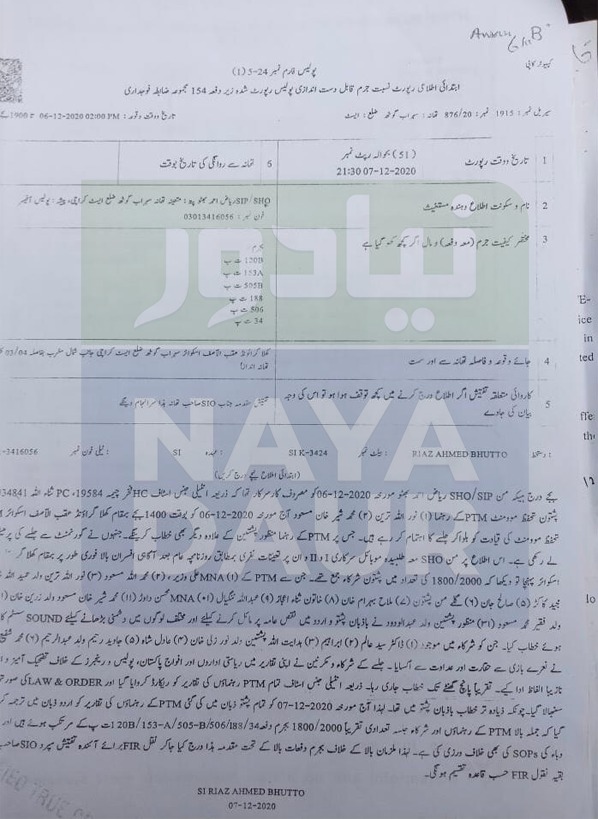
May 16th marked five months since Pashtun Tahaffuz Movement (PTM)-linked MNA Ali Wazir's arrest on charges of issuing derogatory remarks against state institutions.
The case against Wazir accusing him and several PTM leaders of hatching a 'criminal conspiracy' and insulting state institutions was registered at Karachi's Sohrab Goth police station in December last year, following which he was taken into custody from Peshawar. The arrest was made after the lawmaker's participation in a ceremony held at the Army Public School (APS) Shuhada library to mark anniversary of the APS attack.
Others named in the FIR included PTM chief Manzoor Pashteen, MNA Mohsin Dawar, activists Sana Ijaz, Dr Said Alam, Javed Raheen, Muhammadullah Mehsud, Noorullah Tareen, Saleh Jan, Mullah Behram, Abdullah Nangyal, Sher Khan Mehsud, Qazi Tahir, Gilaman Pashteen and Hidayatullah Pashteen.
The FIR included sections 120-B (criminal conspiracy), 153-A (promoting enmity between different groups), 505-B (statements for inducing a person to commit offence against state), 506 (criminal intimidation) and 188 (disobeying order of public servant) of the Pakistan Penal Code.

All others booked along with Ali Wazir were granted bail, but he remains under arrest. Sindh High Court (SHC) reserved its verdict on Wazir's bail application on March 5, but the decision is yet to be announced. Ali Wazir's lawyer Qadir Khan thinks this delay is unusual. According to the National Judicial Policy, bail applications must be decided within seven (7) days by the High Court.
"There is no recent example of verdict on a bail application being reserved for this long," he told Naya Daur Media.
Pashto speech lost in translation?
Ali Wazir's lawyer terms the trial unfair and says that the prosecution relied on stereotypes instead of facts. The speech for which Ali Wazir was arrested was delivered in Pashto. As per practice, it had to be translated for court records, but Qadir Khan says that the translation was done by a police constable and was therefore inaccurate and out of context. A Pashto idiom that the detained lawmaker had used during his speech was misinterpreted, the lawyer says.
"The translated version reflected that the prosecution based the case on preconceived notions and stereotypes about the Pashtun community," he said.
Many activists and human rights defenders have been echoing the sentiments expressed by Wazir's lawyer, saying that the arrested MNA is a 'prisoner of conscience'.
https://twitter.com/a_siab/status/1386391265097306114?s=20
Meanwhile, Pakistan People's Party (PPP)-led Sindh government's role in Ali Wazir's arrest particularly raised eyebrows with activists on social media reminding the party that the alleged mistreatment of a lawmaker under its watch does not bode well for the party's progressive credentials. PPP Chairman Bilawal-Bhutto Zardari had previously raised voice against Wazir and his fellow PTM lawmaker Mohsin Dawar's arrest when they were held in 2019 following the Khar Qamar incident.
Responding to the criticism, Sindh government spokesman Murtaza Wahab wrote on Twitter on May 10 that the judiciary is independent, implying that the PPP government had little role in Wazir's arrest. He also termed the delay in his bail application unfortunate.
https://twitter.com/murtazawahab1/status/1391649141877624835?s=20
MNA Mohsin Dawar, however, says that the action against Ali Wazir took place with Sindh government's consent and the provincial authorities cannot deny responsibility. Talking to Naya Daur Media, Dawar said that the unusual delay in Ali Wazir's bail application makes it clear that the case was filed on the whims of the powers-that-be, but added that the Sindh government should have resisted the action.
"Those who actually initiated the case operate underground and cannot be named," he said, adding that Wazir's bail application is being delayed for no reason.
There were reports on social media of Ali Wazir having been tortured in police custody. When asked, Mohsin Dawar said that he took up the matter with the Sindh government officials when the reports emerged during initial days of his arrest and that Wazir is now in judicial custody where he is being treated well.
'FIR against Ali Wazir lodged without PPP leadership's approval'
PPP leader and former Senator Farhatullah Babar, in response to a question about the criticism of PPP over the issue, said that the FIR against Ali Wazir was lodged without approval of party's political leadership. "In fact it was lodged without its knowledge," he said, adding that Pakistan's 'de facto rulers' were behind Wazir's arrest.
Farhatullah further said that the case of Ali Wazir was unique and 'a typical example of how the hybrid regime manipulates', adding that strings are pulled through bureaucracy behind the back of political leadership.
"The police department wrote a letter to provincial Home Secretary seeking permission to institute FIR against Ali Wazir on the basis of a complaint made by someone. Under a 2018 order, the provincial Home Secretary is authorised to give approval for FIRs without referring it to the cabinet. It’s a sort of blanket permission of a generic nature given to Home Secretary," he said.
The PPP leader explained that when the police formally requested Home Secretary's permission, he readily granted it without recourse to political leadership. "I really can’t say why he did so even if he was authorised to do so," he says.
Farhatullah Babar added that ordinarily one would expect that such issues are brought to attention of political leadership even if bureaucracy is empowered to decide.
"Be that as it may Ali Wazir's bail application is pending before the chief justice of the Sindh High Court. It was last heard on March 5 when judgment was reserved. It has still not been announced. This should sum up the dilemma of the political leadership of the provincial government which willy nilly has to bear the brunt of all this. Such is the price paid by the de jute accountable political leaders for the decisions taken by the unaccountable de facto rulers," the PPP leader lamented.
The case against Wazir accusing him and several PTM leaders of hatching a 'criminal conspiracy' and insulting state institutions was registered at Karachi's Sohrab Goth police station in December last year, following which he was taken into custody from Peshawar. The arrest was made after the lawmaker's participation in a ceremony held at the Army Public School (APS) Shuhada library to mark anniversary of the APS attack.
Others named in the FIR included PTM chief Manzoor Pashteen, MNA Mohsin Dawar, activists Sana Ijaz, Dr Said Alam, Javed Raheen, Muhammadullah Mehsud, Noorullah Tareen, Saleh Jan, Mullah Behram, Abdullah Nangyal, Sher Khan Mehsud, Qazi Tahir, Gilaman Pashteen and Hidayatullah Pashteen.
The FIR included sections 120-B (criminal conspiracy), 153-A (promoting enmity between different groups), 505-B (statements for inducing a person to commit offence against state), 506 (criminal intimidation) and 188 (disobeying order of public servant) of the Pakistan Penal Code.

A copy of the FIR
All others booked along with Ali Wazir were granted bail, but he remains under arrest. Sindh High Court (SHC) reserved its verdict on Wazir's bail application on March 5, but the decision is yet to be announced. Ali Wazir's lawyer Qadir Khan thinks this delay is unusual. According to the National Judicial Policy, bail applications must be decided within seven (7) days by the High Court.
"There is no recent example of verdict on a bail application being reserved for this long," he told Naya Daur Media.
Pashto speech lost in translation?
Ali Wazir's lawyer terms the trial unfair and says that the prosecution relied on stereotypes instead of facts. The speech for which Ali Wazir was arrested was delivered in Pashto. As per practice, it had to be translated for court records, but Qadir Khan says that the translation was done by a police constable and was therefore inaccurate and out of context. A Pashto idiom that the detained lawmaker had used during his speech was misinterpreted, the lawyer says.
"The translated version reflected that the prosecution based the case on preconceived notions and stereotypes about the Pashtun community," he said.
Many activists and human rights defenders have been echoing the sentiments expressed by Wazir's lawyer, saying that the arrested MNA is a 'prisoner of conscience'.
https://twitter.com/a_siab/status/1386391265097306114?s=20
Meanwhile, Pakistan People's Party (PPP)-led Sindh government's role in Ali Wazir's arrest particularly raised eyebrows with activists on social media reminding the party that the alleged mistreatment of a lawmaker under its watch does not bode well for the party's progressive credentials. PPP Chairman Bilawal-Bhutto Zardari had previously raised voice against Wazir and his fellow PTM lawmaker Mohsin Dawar's arrest when they were held in 2019 following the Khar Qamar incident.
Responding to the criticism, Sindh government spokesman Murtaza Wahab wrote on Twitter on May 10 that the judiciary is independent, implying that the PPP government had little role in Wazir's arrest. He also termed the delay in his bail application unfortunate.
https://twitter.com/murtazawahab1/status/1391649141877624835?s=20
MNA Mohsin Dawar, however, says that the action against Ali Wazir took place with Sindh government's consent and the provincial authorities cannot deny responsibility. Talking to Naya Daur Media, Dawar said that the unusual delay in Ali Wazir's bail application makes it clear that the case was filed on the whims of the powers-that-be, but added that the Sindh government should have resisted the action.
"Those who actually initiated the case operate underground and cannot be named," he said, adding that Wazir's bail application is being delayed for no reason.
There were reports on social media of Ali Wazir having been tortured in police custody. When asked, Mohsin Dawar said that he took up the matter with the Sindh government officials when the reports emerged during initial days of his arrest and that Wazir is now in judicial custody where he is being treated well.
'FIR against Ali Wazir lodged without PPP leadership's approval'
PPP leader and former Senator Farhatullah Babar, in response to a question about the criticism of PPP over the issue, said that the FIR against Ali Wazir was lodged without approval of party's political leadership. "In fact it was lodged without its knowledge," he said, adding that Pakistan's 'de facto rulers' were behind Wazir's arrest.
Farhatullah further said that the case of Ali Wazir was unique and 'a typical example of how the hybrid regime manipulates', adding that strings are pulled through bureaucracy behind the back of political leadership.
"The police department wrote a letter to provincial Home Secretary seeking permission to institute FIR against Ali Wazir on the basis of a complaint made by someone. Under a 2018 order, the provincial Home Secretary is authorised to give approval for FIRs without referring it to the cabinet. It’s a sort of blanket permission of a generic nature given to Home Secretary," he said.
The PPP leader explained that when the police formally requested Home Secretary's permission, he readily granted it without recourse to political leadership. "I really can’t say why he did so even if he was authorised to do so," he says.
Farhatullah Babar added that ordinarily one would expect that such issues are brought to attention of political leadership even if bureaucracy is empowered to decide.
"Be that as it may Ali Wazir's bail application is pending before the chief justice of the Sindh High Court. It was last heard on March 5 when judgment was reserved. It has still not been announced. This should sum up the dilemma of the political leadership of the provincial government which willy nilly has to bear the brunt of all this. Such is the price paid by the de jute accountable political leaders for the decisions taken by the unaccountable de facto rulers," the PPP leader lamented.
